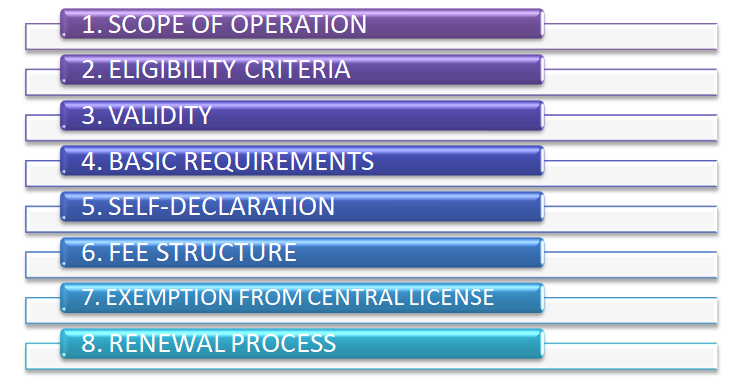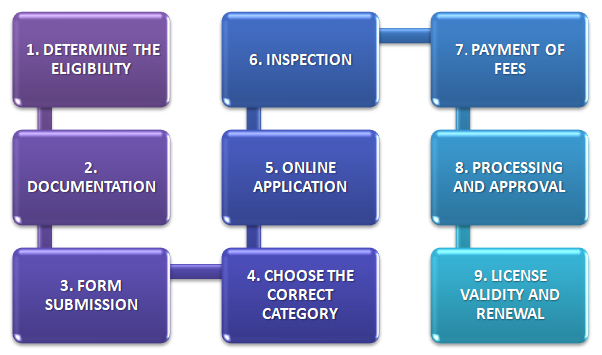FSSAI STATE LICENSE
The Food Safety and Standards Authority of India (FSSAI) is an autonomous body established under the Ministry of Health and Family Welfare, Government of India. It is responsible for regulating and supervising the food safety and standards in the country. FSSAI was created to ensure that the food products consumed by the public are safe, hygienic, and adhere to the prescribed quality standards.
STATE REGISTRATION UNDER FSSAI
One of the essential components of FSSAI's regulatory framework is the requirement for food businesses to obtain licenses or registrations depending on their scale of operations. State Registration is a type of license issued by FSSAI, primarily intended for small and medium-sized food businesses. It is applicable to food operators who operate within a single state in India.
KEY FEATURES OF FSSAI STATE REGISTRATION

1. Scope of Operation: FSSAI State Registration is suitable for food businesses that operate at the state level. It covers activities such as manufacturing, processing, storage, distribution, and sale of food products within one state.
2. Eligibility Criteria: Small and medium-sized food businesses with an annual turnover up to a specified limit (which may vary from state to state) are eligible to apply for State Registration.
3. Validity: The State Registration is typically valid for a period of one to five years, depending on the preferences of the food business operator.
4. Basic Requirements: To obtain FSSAI State Registration, the applicant must provide basic details of the food business, such as name, address, type of food business, and contact information.
5. Self-declaration: Applicants are required to provide a self-declaration stating that they comply with the necessary food safety and hygiene requirements as specified by the FSSAI.
6. Fee Structure: The fee for obtaining FSSAI State Registration is relatively lower than other types of licenses, making it more affordable for small-scale businesses.
7. Exemption from Central License: Food businesses operating within a single state and having a turnover below a certain threshold may be exempted from obtaining a Central License, which is mandatory for businesses operating at an inter-state level.
8. Renewal Process: Food businesses must ensure that they renew their State Registration before it expires to maintain compliance with FSSAI regulations.
BENEFITS OF FSSAI STATE LICENSE
1. LEGALLY COMPLIANT
2. CONSUMER TRUST AND CONFIDENCE
3. EXPANSION OPPORTUNITIES
4. ACCESS TO GOVERNMENT TENDERS
5. COLLABORATION WITH OTHER BUSINESSES
6. QUALITY ASSURANCE
1. Legally compliant: With an FSSAI State License, your food business becomes legally compliant with the food safety regulations set by the Indian government. This ensures that your business operates within the boundaries of the law and avoids potential penalties or closures due to non-compliance.
2. Consumer trust and confidence: Holding an FSSAI license, especially the State License, instills trust and confidence in consumers about the safety and quality of your food products. It demonstrates your commitment to maintaining high standards in food preparation and handling.
3. Expansion opportunities: If you plan to expand your food business to other locations within the same state, having an FSSAI State License makes the process smoother. It serves as a prerequisite for setting up new outlets or branches.
4. Access to government tenders: For certain government tenders or contracts, an FSSAI license might be a mandatory requirement. Holding a State License opens up opportunities to participate in such tenders.
5. Collaboration with other businesses: Many distributors, suppliers, and retail chains prefer to collaborate with FSSAI-registered food businesses. Having a State License can improve your chances of forming partnerships with such entities.
6. Quality assurance: The FSSAI State License involves compliance with specific quality and safety standards. Implementing these standards helps ensure that your food products are of high quality, minimizing the risk of health hazards to consumers.
7. Brand reputation: An FSSAI license can enhance your brand's reputation in the market. It shows that you are committed to maintaining food safety and hygiene standards, which can attract more customers and boost loyalty.
8. Improved market access: Some retail platforms and e-commerce websites require food businesses to have an FSSAI license to sell their products on their platforms. Holding a State License can provide better market access and visibility on such platforms.
LIST OF DOCUMENTS REQUIRED FOR FSSAI STATE LICENCE
The specific documents required for obtaining an FSSAI State License can vary depending on the type and scale of the food business. However, in general, the following are some common documents that are typically required for applying for an FSSAI State License in India:
1. Form-B duly completed and signed.
2. Blueprint/layout plan of the processing unit (if applicable).
3. List of directors/partners/proprietor with address, contact details, and photo ID.
4. Photo ID and address proof of the responsible person (proprietor, partner, director, etc.).
5. Certificate of incorporation/registration (for companies and partnership firms).
6. MOA/AOA (Memorandum of Association/Articles of Association) or partnership deed.
7. List of food products to be manufactured/processed/packed.
8. Source of milk/meat/ingredients (if applicable).
9. Food safety management system plan (if required).
10. Plan for food safety recall (if required).
11. NOC (No Objection Certificate) from the local municipality or the Panchayat (if applicable).
12. Proof of possession of the premises (rent agreement, lease deed, etc.).
13. Identity and address proof of the premises (utility bills, property tax receipt, etc.).
14. Certificate from the Ministry of Tourism (for hotels).
15. Supporting documentary proof of turnover or self-declaration of turnover.
16. Analysis report of water to be used in food processing.
17. Source of milk and procurement plan for milk-based products.
18. NOC from the manufacturer (for re-labellers and re-packers).
Please note that this list is not exhaustive, and additional documents might be required based on the specific category and nature of the food business. It is always recommended to visit the official FSSAI website or contact the local FSSAI office to get the most up-to-date and accurate information on the required documents for obtaining an FSSAI State License.
GENERAL PROCESS OF OBTAINING AN FSSAI STATE LICENSE

The process of obtaining an FSSAI State License involves several steps, and it is important to follow them diligently to ensure a smooth and successful application. Here is a general outline of the process:
1. Determine the eligibility: Check whether your food business falls under the category that requires an FSSAI State License. State Licenses are usually applicable to medium-sized food businesses. If your business is small-scale or large-scale, you might need a different category of license.
2. Documentation: Gather all the necessary documents required for the FSSAI State License application. Refer to the previous list of documents required for the license.
3. Form submission: Complete the Form-B provided by the FSSAI. This form is the application form for State License. You can obtain this form from the official FSSAI website or the local FSSAI office.
4. Choose the correct category: Select the appropriate category of State License based on the nature and turnover of your food business. FSSAI has categorized licenses based on factors such as annual turnover and whether you are a manufacturer, storage, distributor, etc.
5. Online application: Visit the Food Licensing and Registration System (FLRS) portal of the FSSAI website (https://foodlicensing.fssai.gov.in) and create an account. Fill in the required details and upload the necessary documents.
6. Inspection: Once your online application is submitted, an FSSAI official will conduct an inspection of your food business premises. They will verify the details provided in the application and assess the adherence to food safety and hygiene standards.
7. Payment of fees: Pay the required fees for the State License as per the guidelines provided by FSSAI. The fee amount depends on the category and scale of your food business.
8. Processing and approval: After the inspection and verification of documents, the FSSAI will process your application. If everything is found to be in order, you will receive the FSSAI State License.
9. License validity and renewal: The FSSAI State License is typically valid for one to five years. Make sure to renew the license before its expiration to ensure continuous legal compliance.
FAQS
Q.1 What is an FSSAI State License?
Ans: FSSAI State License is a mandatory permit for medium-sized food businesses operating within a state in India to ensure compliance with food safety standards.
Q.2. Who needs an FSSAI State License?
Ans: Medium-scale food businesses, including manufacturers, storage units, distributors, and transporters, require an FSSAI State License.
Q.3. How to apply for an FSSAI State License?
Ans: Submit the required documents and application form online through the Food Licensing and Registration System (FLRS) portal of FSSAI.
Q.4. What is the validity period of an FSSAI State License?
Ans: The validity of an FSSAI State License ranges from one to five years.
Q.5. Is an FSSAI State License essential for every state?
Ans: Yes, separate State Licenses are required for each state where a food business operates.
Q.6. Can a State License be upgraded to a Central License?
Ans: Yes, businesses can upgrade from an FSSAI State License to a Central License if they expand their operations to multiple states or have a higher turnover.
Q.7. What happens if a food business operates without an FSSAI State License?
Ans: Operating without a valid FSSAI State License may lead to penalties, fines, or closure of the business.
Q.8. Is an FSSAI State License transferable?
Ans: No, an FSSAI State License is not transferable and applies only to the specific entity that obtained it.
Q.9. Are there any exemptions from obtaining an FSSAI State License?
Ans: Small-scale food businesses with turnover below the specified threshold may be exempt from FSSAI registration, depending on the state's regulations.
Q.10. What is the role of the FSSAI State License in ensuring food safety?
Ans: The FSSAI State License ensures that food businesses comply with food safety standards, protecting consumer health and promoting food quality.

